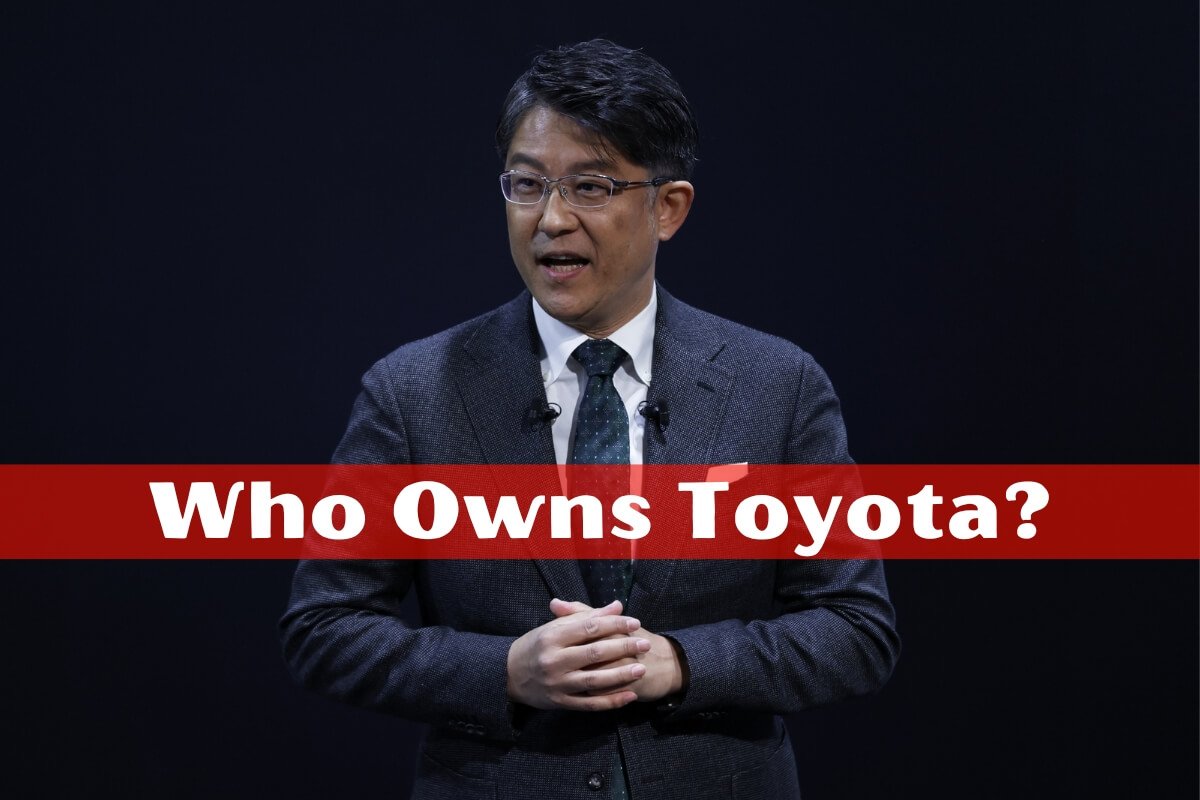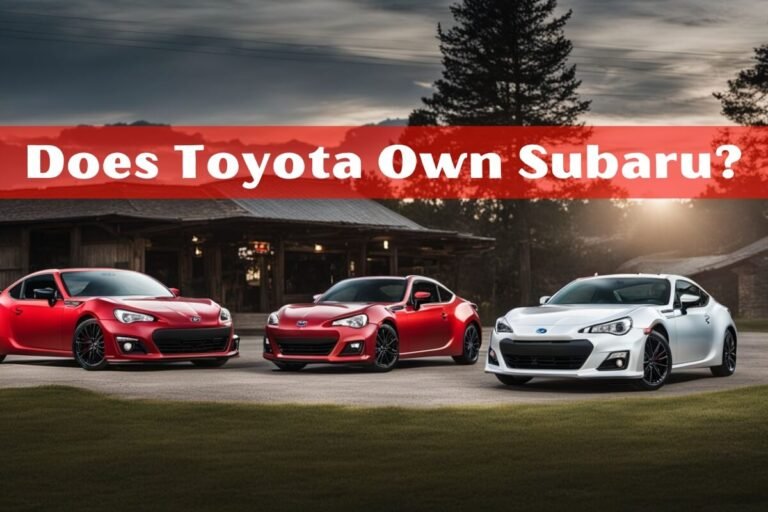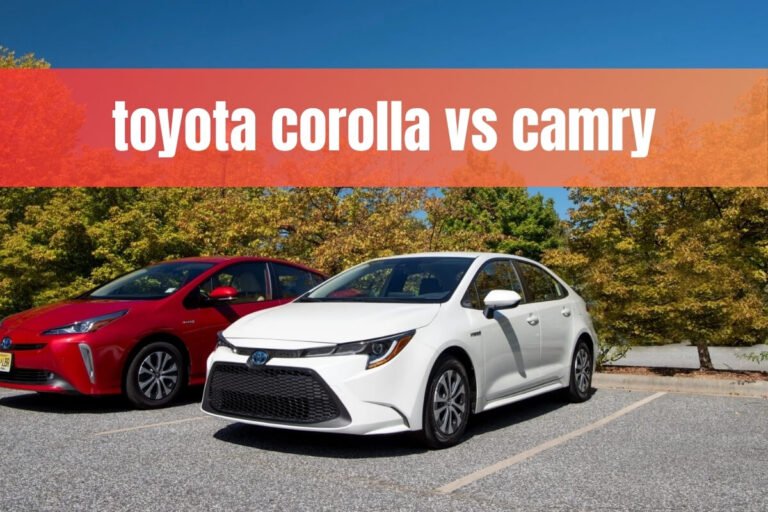Who Owns Toyota? Unveiling the Automotive Giant

For over eight decades, Toyota Motor Corporation has been at the forefront of the global automotive industry, renowned for its innovative spirit, commitment to quality, and unwavering pursuit of excellence. From humble beginnings as a textile machinery company in Japan, Toyota has transformed into a multinational conglomerate, captivating the world with its diverse range of vehicles and relentless drive for sustainable mobility solutions.
But who exactly owns this automotive powerhouse, and how has Toyota’s ownership structure evolved over the years?
Toyota Motor Corporation is a publicly-traded company primarily owned by the Toyota Industries Corporation, which holds a significant stake on behalf of the founding Toyoda family. Additionally, a diverse group of institutional investors and individual shareholders from around the world contribute to Toyota’s ownership.
Learn about Toyota’s ownership, history, and corporate structure. Discover the key players behind the company’s strategic decisions, its partnerships, financial performance, and commitment to innovation and sustainability. Get a clear picture of how Toyota continues to shape the automotive industry.
Toyota’s Founding and Historical Roots
Toyota’s journey commenced in 1937 when Kiichiro Toyoda, the son of Sakichi Toyoda, a renowned inventor and industrialist, established the company as a spin-off from his family’s textile machinery business. Originally named “Toyoda Automatic Loom Works,” the company’s foray into the automotive industry was a bold and ambitious endeavor.
Kiichiro Toyoda’s vision was to create a reliable and affordable vehicle for the Japanese market, and in 1936, the company unveiled its first product, the Model AA sedan. This milestone marked the beginning of Toyota’s transformation from a textile machinery manufacturer into a pioneering automaker.
Decoding Toyota’s Corporate Ownership and Shareholding
Today, Toyota Motor Corporation stands as a global automotive juggernaut, with its shares publicly traded on the Tokyo Stock Exchange and the New York Stock Exchange. However, the company’s ownership structure is deeply rooted in its Japanese heritage and the Toyoda family’s legacy.
The largest shareholder in Toyota Motor Corporation is Toyota Industries Corporation, a diversified manufacturing company that holds approximately 6.7% of the shares. This stake represents the Toyoda family’s enduring connection to the company they founded decades ago.
Apart from Toyota Industries Corporation, other major institutional shareholders include prominent Japanese banks, such as The Master Trust Bank of Japan, Ltd., and Japan Trustee Services Bank, Ltd. These institutions collectively hold a significant portion of Toyota’s shares, reflecting the company’s strong ties to the Japanese financial sector.
Toyota’s ownership structure also encompasses a diverse array of individual and institutional investors from around the world, contributing to the company’s global reach and financial stability.
Is Toyota Still a Japanese-Owned Company?
While Toyota has undoubtedly evolved into a multinational corporation with manufacturing facilities and operations spanning multiple continents, its roots remain firmly planted in Japan. The company’s global headquarters is located in Toyota City, Aichi Prefecture, a testament to its unwavering connection to its homeland.
Despite its global presence, Toyota continues to maintain a strong foothold in Japan, where it employs a significant portion of its workforce and operates numerous production facilities. This commitment to its Japanese heritage is deeply ingrained in Toyota’s corporate culture and decision-making processes.
Toyota’s Leadership and Board of Directors
Toyota’s leadership team and board of directors play a crucial role in shaping the company’s strategic vision and ensuring adherence to its core values. At the helm of Toyota’s operations is Akio Toyoda, the current President and CEO, who hails from the founding Toyoda family.
Akio Toyoda’s appointment as CEO in 2009 marked a significant milestone in Toyota’s history, as he became the first member of the founding family to lead the company in over a decade. His leadership has been instrumental in navigating Toyota through challenging times and maintaining the company’s commitment to innovation and customer satisfaction.
In addition to Akio Toyoda, Toyota’s board of directors comprises a diverse group of experienced professionals from various backgrounds, including industry experts, financial advisors, and representatives from Toyota’s key shareholders. This diverse composition ensures a well-rounded perspective and responsible decision-making processes.
Toyota’s Partnerships and Strategic Investments
In an ever-evolving automotive landscape, Toyota has recognized the importance of strategic partnerships and investments to stay ahead of the curve. One notable example is Toyota’s stake in Subaru Corporation, a renowned Japanese automaker known for its all-wheel-drive vehicles and boxer engines.
Toyota holds a 20.02% ownership stake in Subaru, fostering a collaborative relationship that has enabled the companies to share technologies and leverage each other’s strengths. This partnership has yielded innovative products, such as the Toyota 86 (co-developed with Subaru), and has facilitated the integration of Subaru’s renowned all-wheel-drive systems into select Toyota models.
Additionally, Toyota has a 4.94% stake in Suzuki Motor Corporation, another Japanese automotive manufacturer known for its compact and affordable vehicles. This strategic investment aims to leverage Suzuki’s expertise in the small car segment and explore opportunities for joint development and production.
Beyond the automotive industry, Toyota has also forged partnerships with technology companies and research institutions to drive innovation in areas such as autonomous driving, electrification, and connectivity. These collaborations underscore Toyota’s commitment to staying at the forefront of technological advancements and meeting the evolving needs of customers worldwide.
Toyota’s Financial Performance and Market Dominance
Toyota’s ownership structure and strategic partnerships have played a pivotal role in the company’s financial success and market dominance. As of 2023, Toyota remains one of the world’s largest automakers, with a global market share of approximately 11%.
In the fiscal year ending March 31, 2023, Toyota reported total revenues of ¥33.7 trillion (approximately $283 billion USD), with its automotive operations accounting for the majority of this figure. The company’s diverse product lineup, spanning passenger cars, trucks, and luxury vehicles under brands like Toyota, Lexus, Hino, and Daihatsu, has contributed significantly to its financial performance.
Toyota’s financial strength is further bolstered by its successful financial services division, which offers vehicle purchase financing and other related services. This diversified revenue stream has proven invaluable in navigating economic challenges and maintaining Toyota’s profitability.
Geographically, Toyota’s sales are well-distributed, with significant presences in key markets such as North America, Europe, and Asia. This global reach has enabled Toyota to weather regional economic fluctuations and maintain a strong competitive advantage against its rivals.
Toyota’s Commitment to Innovation and Sustainability
Toyota’s ownership structure and corporate governance have consistently prioritized innovation and sustainability, positioning the company as a leader in the development of eco-friendly and cutting-edge automotive technologies.
One of Toyota’s most significant achievements in this realm is the introduction of the Prius hybrid electric vehicle in 1997. The Prius revolutionized the automotive industry by offering a practical and efficient solution to reducing emissions and improving fuel economy. Since its launch, the Prius has become an iconic symbol of Toyota’s commitment to sustainable mobility, inspiring numerous other automakers to follow suit.
Building upon the success of the Prius, Toyota has continued to invest heavily in research and development, exploring new frontiers in electrification, hydrogen fuel cell technology, and autonomous driving systems. The company’s recent unveiling of the bZ4X, an all-electric SUV, and the Mirai hydrogen fuel cell vehicle, demonstrate its unwavering dedication to pioneering sustainable transportation solutions.
Moreover, Toyota has set ambitious targets for reducing its environmental footprint, aiming to achieve net-zero carbon emissions across its entire value chain by 2050. This commitment extends beyond the vehicles themselves, encompassing Toyota’s manufacturing processes, logistics operations, and overall business practices.
Common Questions About Toyota’s Ownership
To provide further clarity and address common inquiries, let’s explore some frequently asked questions regarding Toyota’s ownership:
Does Toyota own any other car brands?
Yes, Toyota Motor Corporation owns Lexus, a luxury vehicle brand established in 1989. Additionally, the company has ownership stakes in Subaru (20.02%) and Suzuki (4.94%), as mentioned earlier.
Who are Toyota’s biggest competitors?
Toyota’s primary competitors in the global automotive market include well-established automakers such as Volkswagen Group, General Motors, Ford Motor Company, Honda Motor Company, and Hyundai Motor Group, among others.
How has Toyota’s ownership structure evolved over time?
While the Toyoda family and Toyota Industries Corporation have maintained a significant stake in Toyota Motor Corporation since its inception, the company’s ownership structure has become more diversified over the years. The addition of institutional investors and individual shareholders from around the world has contributed to Toyota’s global reach and financial stability.
What is Toyota’s global market share?
As of 2023, Toyota holds approximately 11% of the global automotive market share, solidifying its position as one of the world’s largest and most influential automakers.
What is the future outlook for Toyota’s ownership and leadership?
Toyota’s future outlook remains promising, with the company’s ownership structure and leadership poised to navigate the challenges and opportunities that lie ahead. While the Toyoda family and Toyota Industries Corporation will likely maintain their influential roles, Toyota’s diverse shareholder base and experienced leadership team position the company to adapt to changing market dynamics and embrace innovation.
Let’s Finish
Toyota’s journey from a humble textile machinery company to a global automotive giant is a testament to the company’s unwavering commitment to innovation, quality, and customer satisfaction. The company’s ownership structure, deeply rooted in its Japanese heritage and the Toyoda family’s legacy, has been a driving force behind its success.
With a diverse shareholder base, strategic partnerships, and a visionary leadership team, Toyota has consistently demonstrated its ability to adapt to changing market conditions and stay ahead of the curve. From the groundbreaking Prius hybrid to the cutting-edge bZ4X electric vehicle, Toyota’s commitment to sustainable mobility solutions has set new benchmarks for the industry.
As the world embraces a future defined by electrification, autonomous driving, and connectivity, Toyota’s ownership structure and corporate governance will continue to play a critical role in shaping the company’s strategic direction. With a strong foundation built on innovation, quality, and sustainability, Toyota is poised to maintain its position as a global automotive leader, delivering exceptional products and services that exceed customer expectations.






